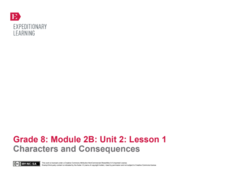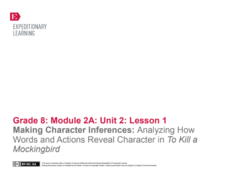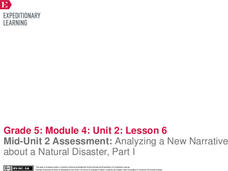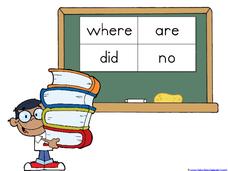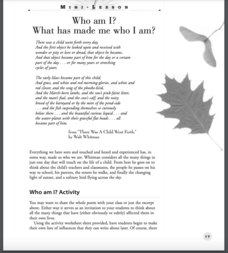Curated OER
"I Believe..." Podcast Style
Use this communication skills lesson plan to emphasize evaluating a speaker's main point and argument. After reading Martin Luther King's, "I Have a Dream Speech" and John F. Kennedy's speech, "I Believe in an America Where the...
Curated OER
I Have - Who Has?
In this letter recognition worksheet set, students use the cards to participate in an "I Have - Who Has?" activity. They hold up a card that says, "I have ___., Who has ___?"
Curated OER
Prompt and Answer: I Have, Who Has
In this grammar worksheet, 2nd graders respond to a given prompt and answer using the phrases I have and who has; this page contains 12 response cards.
Curated OER
The Odyssey Lesson 5
Review the vocabulary from The Odyssey with this fun "I Have, Who Has" game. First, give students random vocabulary cards (included) that say "I have (vocabalary word). Who has (definition of another vocabulary word)?" Students are...
EngageNY
Characters and Consequences
Scholars consider how dialogue reveals aspects of a play's characters as they read Shakespeare's A Midsummer Night's Dream and complete a written conversation note-catcher. Additionally, pupils participate in an I Have/Who Has jigsaw...
EngageNY
Making Character Inferences: Analyzing How Words and Actions Reveal Character in To Kill a Mockingbird
Partner up! After an I have/who has activity, readers partner with one of their discussion appointments to add evidence from chapters 11-13 in To Kill a Mockingbird to the Atticus Note-catcher. Partners then share with the class and add...
Curated OER
Who / Whom Practice
In this nominative and objective pronouns worksheet, young scholars read the rules for using "who" and "whom". Students read ten sentences and indicate which word is correct for each.
National Woman's History Museum
Women of Wonder: Who Do I Admire?
Celebrate superwomen during Women's History Month with a lesson that showcases a variety of female role models. Following a whole-class discussion on superheroes, role models, respect, and admiration, scholars listen to several...
Read Works
How to Say “I Ruff You”
Who says you need a human to be your valentine on Valentine's Day? Give your dog-loving readers an inspiring perspective on how a sister givdes her brother a valentine from the family dog. They then answer 10 questions thatd involve...
EngageNY
Mid-Unit 2 Assessment: Analyzing a New Narrative about a Natural Disaster, Part I
Scholars complete a mid-unit assessment by analyzing a narrative text, In the Middle of the Storm. Learners determine the gist of the text, identify synonyms, make inferences, and answer text-dependent questions to demonstrate...
EngageNY
Evaluating an Argument: The Polyface Local Sustainable
Who has the better argument? Class members work in small groups to compare the arguments on the Example of Strong and Flawed Arguments sheet. They then analyze Michael Pollan’s argument on pages 161–166 of The Omnivore’s Dilemma and...
Curated OER
Who/Whom Usage Practice
In this who and whom practice worksheet, young scholars read an informative activity. Students then respond to 10 questions that require them to use who and whom appropriately.
K12 Reader
The Spy Will Try Not to Cry
Learn all about the exploits of a sly spy from the short poem included on this resource. The poem, intended to provide practice with long /i/ words that use the letter y, is paired with three reading comprehension questions for pupils to...
Curated OER
I Know an Old Lady
Young learners sing the song "I Know an Old Who Swallowed a Fly." They learn to track the words on a pocket chart and identify rhymes in the song as they are learning. Using illustrations, a flip chart, and the song, the teacher will...
Houghton Mifflin Harcourt
Journeys: Challenge Activities (Theme 1)
This nine-page packet, the first in the series of support materials for the Houghton Mifflin Harcourt thematic units on journeys, contains enrichment activities for learners who have mastered the basic concepts of the lessons....
Perkins School for the Blind
Where Shall I Put It?
Position and positional phrases are concepts that need to be constructed for learners with low or no vision. Help them gain competence and a conceptual understanding of words like on, in, and under with a funny game. After gathering a...
Curated OER
Who is the Expert? Exploring Credible Sources in Healthcare
How do you decide what sources are credible when researching online? Evaluate sources with a focus on researching health issues. After brainstorming common health concerns and how they would try to diagnose these problems, class members...
Global Oneness Project
What Does it Mean to Be Resilient?
Imagine the determination it would take to build a helicopter out of scrap. Now imagine doing it while hindered by the effects of polio. Everything is Incredible, a short film by Tyler Bastian, introduces Agustin who has been...
1 plus 1 plus 1 equals 1
I Can Read! Sight Words Set #10
Focus on sight words with a series of worksheets for beginning readers. Kids can work on where, are, did, and no with matching games and tracing activities, and many more.
Penguin Books
An Educator’s Guide to Ruta Sepetys
Historical fiction novels give readers a chance to step into someone else's shoes. An educator's guide from Penguin Common Core Lesson Plans provides resources to accompany three historical fiction novels written by Ruta Sepetys: Between...
Curated OER
Have/Has
In this have and has activity, students complete sentences using the words have or has. Students complete 4 sentences total.
1 plus 1 plus 1 equals 1
I Can Read! Sight Words Set #2
Practice reading common sight words with a series of enriching activities. From bingo to connecting the dots to matching words, the packet has something for everyone!
Scholastic
Who Am I? What Has Made Me Who I Am?
"Everything we have seen and touched and heard and experienced has, in some way, made us who we are." Your young learners will use this resource to create lists of influences (people, animal, nature, places, etc.) in their lives and to...
Houghton Mifflin Harcourt
Silly Stories: Extra Support Lessons (Theme 1)
Kids who need extra support with the concepts in the Houghton Mifflin Harcourt thematic unit on silly stories, will benefit from this packet packed with skill builders, activities, exercises, and practice sets.




